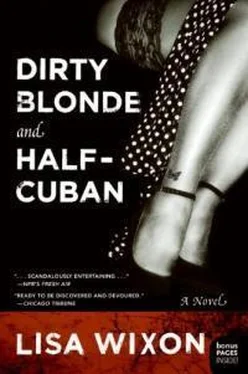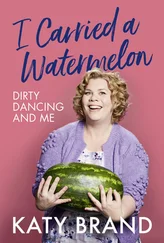Lisa Wixon - Dirty Blonde and Half-Cuban
Здесь есть возможность читать онлайн «Lisa Wixon - Dirty Blonde and Half-Cuban» весь текст электронной книги совершенно бесплатно (целиком полную версию без сокращений). В некоторых случаях можно слушать аудио, скачать через торрент в формате fb2 и присутствует краткое содержание. Жанр: Современная проза, на английском языке. Описание произведения, (предисловие) а так же отзывы посетителей доступны на портале библиотеки ЛибКат.
- Название:Dirty Blonde and Half-Cuban
- Автор:
- Жанр:
- Год:неизвестен
- ISBN:нет данных
- Рейтинг книги:4 / 5. Голосов: 1
-
Избранное:Добавить в избранное
- Отзывы:
-
Ваша оценка:
- 80
- 1
- 2
- 3
- 4
- 5
Dirty Blonde and Half-Cuban: краткое содержание, описание и аннотация
Предлагаем к чтению аннотацию, описание, краткое содержание или предисловие (зависит от того, что написал сам автор книги «Dirty Blonde and Half-Cuban»). Если вы не нашли необходимую информацию о книге — напишите в комментариях, мы постараемся отыскать её.
Dirty Blonde and Half-Cuban — читать онлайн бесплатно полную книгу (весь текст) целиком
Ниже представлен текст книги, разбитый по страницам. Система сохранения места последней прочитанной страницы, позволяет с удобством читать онлайн бесплатно книгу «Dirty Blonde and Half-Cuban», без необходимости каждый раз заново искать на чём Вы остановились. Поставьте закладку, и сможете в любой момент перейти на страницу, на которой закончили чтение.
Интервал:
Закладка:
“Are you going to marry Ignacio?” I ask Camila when the workers leave.
“He is already.”
“He’s married?”
She smiles as I flop down on a chair, dying from the humidity. “His wife’s family backed his oil ventures and are still owners in his company. If they divorce, the company would have to be sold. He and his wife are not romantic, they have an arrangement.” She gingerly wipes hair from my brow. “I’m sure I’m not the only cinnamon in Ignacio’s chocolate.”
“Doesn’t that bother you?” But I know her answer will be the same as that of the workers when attempting to justify their stolen goods. It’s not the preferable way to live, but basic needs are met a lo cubano,as Cubans are shockingly clever at skirting penury and quixotic rules.
“Ignacio and Reinaldo will be living in Havana on and off for the next few years,” Camila announces.
“You think I’ve a chance with Reinaldo?” I ask Camila.
“No pressure, but if you can hook him, he’s a gift from Oshún. You wouldn’t have to worry about resolving your situation.”
Being able to look for my father full-time would be a dream come true. Earlier this morning, Victor had stopped by my landlord’s home to tell me he was closing in on an address where my mother went to visit José Antonio. It’s the same promise he’s been feeding me for months, and I’m feeling distraught, as if waiting for my own Godot. But no one seems to have any advice except to engage in the national pastime: hanging out. Waiting to wait. Waiting for nothing and waiting for everything.
Camila’s tears interrupt my thoughts. “’Mila, what’s wrong?”
“Cariña,I don’t know.” She wipes away the dampness and attempts a smile. “It’s just that I’m overwhelmed. Thirty-three years old and I have it all. Everything I wanted I worked hard for, and now I have it. Look at this place! It’s amazing!” The house is beautiful, but nearly unlivable by Western standards, with ceilings caving in, and paint five decades untouched. But I know that she means she has it all—all that’s attainable for a Cuban.
“What else is there to do?” she says. “I’ve got the career, the men…”
“Babies?” I suggest, yawning from the heat.
She looks at me a long while and bursts into a fresh round of tears. “Impossible,” she says, patting her stomach. “All the doctors say so.” It will take Camila many more weeks before she confides in me about the brutal incident with a yumaduring her teen years, one that left her scarred and incapable of bearing children.
Knowing the society’s emphasis on motherhood—the highest attainment of femininity—I’m sad for Camila for the first time ever.
IN THE AFTERNOON, I send off my monthly e-mail to my friends. I’m crushed to learn that one is engaged to be married, and I’ve yet to meet her fiancé. I also try not to feel sorry for myself when I learn that my brainy best friend, Susie, has aced her foreign-service exam, and will be leaving Washington soon for her first assignment in Ghana.
My inbox is bare of any e-mails from my father in Washington. My anger has softened some, and part of me still hopes he will change his mind, and offer help.
To avoid thinking about my other life in the U.S., and convinced my mind is melting in the sun, I use my student carnetto gain access to the university library.
There’s no air-conditioning, but I find a stillness in the small spaces and stacks of books. I read about pre-revolutionary Cuba and the words of José Martí, scouring his verses for insight into the Cuban soul. In all my travels, I’ve never encountered a formerly colonial people with such a sense of entitlement and pride. It makes me love being Cuban. But only in reading the poems of the turn-of-the-century writer and statesman do I begin to glimpse the profound sense of history my people possess. And their perennial struggle to be free.
FIRST-RUN MOVIES ARE snatched off satellite, rapidly subtitled, and shown on Cuban TV free of charge to some 11 million citizens. Hollywood filmmakers have no recourse. It’s one of the few benefits of being quarantined by Uncle Sam.
Camila and I are in the middle of The Quiet Americanwhen she shuts off the sound, her eyes refulgent and wide.
“There aren’t any jineterasin your country, are there?”
I’m taken aback by her question. “Well, there are mistresses.”
“Tell me about mistresses,” says Camila, her attention rapt.
“Mistresses are like permanent girlfriends, usually to married men, and the men put them up in apartments or pay their expenses or buy gifts.”
“Do these women play una estafa”—a swindle—“like jineteras?”
Camila is sensitive about the subject, so I try to frame my answers diplomatically. “Some women will only marry men who are rich, whether or not they love them. So yes, I guess if you’re American and you’d only marry, say, a rich finance guy in New York, or a successful movie guy in Hollywood, then that’s pretty much just like a jinetera.”
“Are there any differences?”
I think about it for a moment. “If you lived in almost any other country,” I say, “with your brains and your looks and work ethic—”
“And my education.”
“Precisely, being a doctor. A surgeon. Well, you’d have been able to buy yourself this house without ever having to sleep with anyone you don’t fancy. You’d have a choice. You could be a mistress or not, but there’d be a hundred different ways to afford what you need or want. You wouldn’t have to fuck any old geezers for it. Unless that’s your thing, of course.”
Camila bursts out laughing. “It’s not like here, is it.” She thinks a minute more. “So the girls who jineteanin your country, they can’t respect themselves so much.”
“How do you mean?”
“If you have an opportunity to make your own fula,why would you rely on someone else to do it for you? Why not just do it yourself and find a man whom you really love?”
I nod, and Camila thinks for a moment. “Ignacio said something that bothers me. He said we Cubans don’t understand that our government does everything to keep the American embargo in place, as a way to control us. Ignacio said this like I was stupid!”
“What did you tell him?”
“Nothing, mi vida.He needs to feel important and all-knowing. But it really irritates me when extranjerosthink we don’t understand our own situation.”
As always, when it comes to politics, I don’t say much, as my de afueraviews are generally dismissed. But Camila takes my noncommittal nod to mean I’m hiding information.
“That settles it,” says Camila, standing up. “I’m going to leave Cuba.” I stare at her a moment, in shock. “ Mi corazón!Not permanently. I’m just ready to visit another country. Knowing you makes me understand less about how things work out there, and I need to go see for myself, to connect the dots.”
It’s only the most educated and politically suave Cubans who are allowed to travel abroad temporarily, and it sometimes takes years of planning, but I know Camila will pull it off somehow.
When Camila asks me what I miss most about my country and my former life, I can’t even think about Aunt June, or John, or my friends whose e-mails are a highlight of my days. I open that window only a crack and let myself feel the breeze of mourning for small things. A spoon’s first tap on a crème brûlée, the inky stain on fingertips from reading the International Herald Tribune,and Chesterfield Lights, my irregular and sneaky habit. Even though I’ve been incredibly fortunate to be taken in by Cuban strangers, and they’ve become my family, I miss more than anything the people in my life who know my history and my past, and to whom I don’t have to explain myself. I also miss having a date. A normal dinner out with a regular, semi-nerdy college boy my own age. One who’d laugh if I ever conjured up a bêtise such as The Look.
Читать дальшеИнтервал:
Закладка:
Похожие книги на «Dirty Blonde and Half-Cuban»
Представляем Вашему вниманию похожие книги на «Dirty Blonde and Half-Cuban» списком для выбора. Мы отобрали схожую по названию и смыслу литературу в надежде предоставить читателям больше вариантов отыскать новые, интересные, ещё непрочитанные произведения.
Обсуждение, отзывы о книге «Dirty Blonde and Half-Cuban» и просто собственные мнения читателей. Оставьте ваши комментарии, напишите, что Вы думаете о произведении, его смысле или главных героях. Укажите что конкретно понравилось, а что нет, и почему Вы так считаете.












